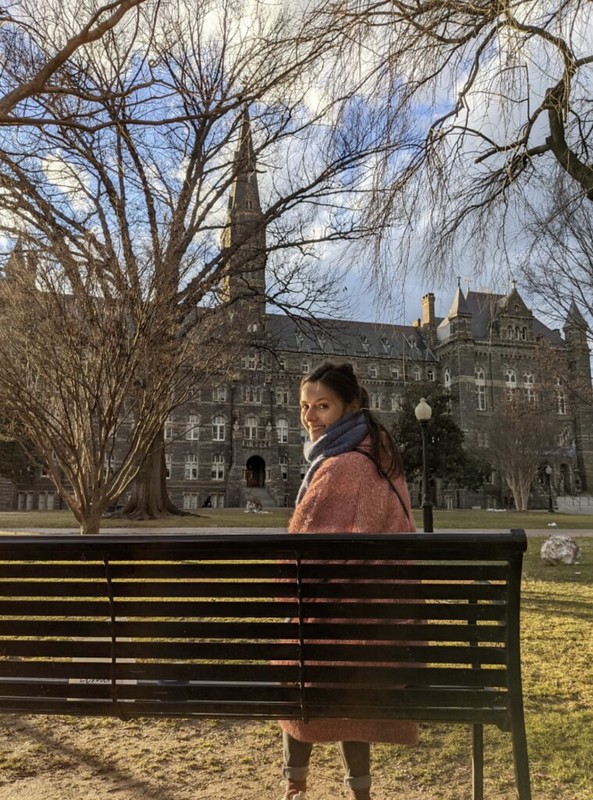“Have you noticed”, my friend told me over brunch the other day, “that Belgians in D.C. usually intend to move back to their home country at some point?” My friend is from a little Flemish town not too far from Antwerp. I myself grew up in another little town not too far from Antwerp. Yet, we met in Washington D.C. (granted: it was in a Belgian-owned bar during a game of the Belgian Red Devils). We both recently moved to the U.S. capital. She is one of the many wonderful people I would never have met had I decided to remain at home, in my comfortable Belgian bubble.
It’s true that even in an international hub like D.C., where you tend to meet people from all over the world (including from your home country), Belgians are the ones that often seem to have quite a strong connection with the home front. Flemish society, I’ve come to realize now, is a pretty tight-knit social structure that people rarely break out of. I must admit that for me, too, moving to another country and spending a year there seemed daunting at first. There were all these practical questions. And would I like it there?
I’d spent a period of two months in D.C. before, as a research fellow at one of its many fascinating research institutes, Dumbarton Oaks. So I was fairly certain that I would like my new city—I had personally experienced how green, lively and livable it was. Still, I applied for a Fulbright grant without knowing exactly what to expect from my new adventure and how I would manage the big change. Nonetheless, I took a leap of faith. Sometimes, you have to get out of your comfort zone and into the deep.
The academic side of things seemed exciting enough. My field is literary studies, and I specialize in popular Christian narratives from the late antique period; stories about martyrs and saints. These religious superheroes inspired entire Christian communities with their miracles and wonderworking. But some stories also tell of demonic opponents: magicians who would antagonize the saints with evil magic. As I’m investigating the rhetorical difference between ‘miracle’ (a supernatural event that is positively interpreted) and ‘magic’ (a similarly supernatural event that is negatively interpreted) in these narratives, I can count on the advice of some excellent scholars at Georgetown University’s History Department; an inspiring academic environment in one of the most beautiful areas of the city.
But there is much more to this experience than research alone. There is something about getting to know a new country from the inside out (for instance, although I knew that US society was less secularized than Flemish society, seeing a church at nearly every street corner made me truly understand the difference), creating a day-to-day routine in a different environment (such as: working at the coffee house, a.k.a. my ‘office space’), and, above all, making lots of new acquaintances and finding new friends. In particular, the Fulbright community has been a great support network for me. Believe me when I say that it is literally full of bright people from all over the world! Hence, I’m not just getting to know the U.S. during my time here, I’m actually learning about many different cultures and places, some far away (in conversations with Cambodian or Costa Rican friends), others closer to home (I’m humbled to admit that one Austrian friend could tell me more about Brussels than I her!).
All of these elements, from the mundane to the ‘miraculous’, have proven my initial hesitation about moving away from home quite unfounded, as they instead contribute to a rich life experience. There’s nothing wrong with being comfortable in your home environment or picturing yourself there in the long term. But I’ve learned that experiences like the one I’m living right now add so much valuable stuff to the mix. I’m grateful to others and proud of myself for making this happen.
Dr. Julie Van Pelt is a Belgian 2020-2021 Fulbright Research Scholar in Literature to Georgetown University. Julie Van Pelt studied Classics and Comparative Modern Literary Studies at Ghent University, where she obtained a PhD in Greek Literature in 2019 with a dissertation on disguise and performance in Byzantine hagiography. Between 2014 and 2020 she held several research positions as a PhD candidate, and in 2019 she was a summer fellow at Dumbarton Oaks. As a member of the ERC research project Novel Saints, she studied the reception of ancient fiction in late antique hagiography. In her current research, she investigates the figure of the magician and literary strategies for distinguishing miracle and magic in this genre.
Articles are written by Fulbright grantees and do not reflect the opinions of the Fulbright Commission, the grantees’ host institutions, or the U.S. Department of State.


